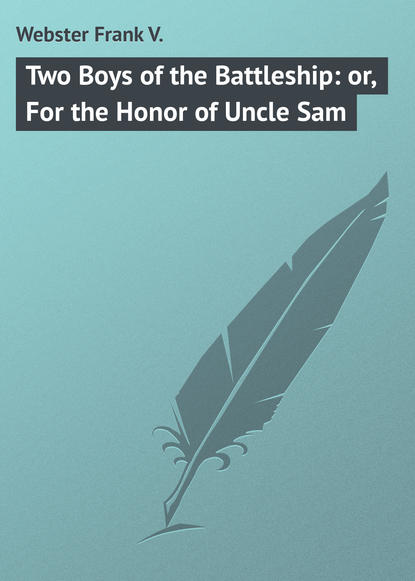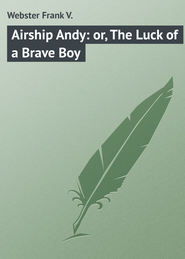По всем вопросам обращайтесь на: info@litportal.ru
(©) 2003-2024.
✖
Two Boys of the Battleship: or, For the Honor of Uncle Sam
Настройки чтения
Размер шрифта
Высота строк
Поля
“Well, we leave here to-morrow,” said Frank one day, as he and his brother were taking their ease on deck, having just finished their tour of duty.
“Yes, it’s been a great time while it lasted, but I do wish we had some good news to take back North to Uncle Phil.”
“So do I.”
The battleship was soon to leave. Matters in Uridio had now quieted down, and the government had the situation well in hand. Every promise was made that the rights of the Americans would be respected, and they were to be given adequate sums for the damage caused to their property by the rebels. The stronghold of the latter had literally been blown to bits by the big guns of the Georgetown.
Shortly after reveille one morning word was given to hoist the anchors. A parting salute had been fired as a compliment to the Uridian flag. It was answered from a small land battery. The one cruiser owned by the rebels had not been seen since the Georgetown had pursued her.
What had become of her was not learned until later, when it was discovered that her commander had been told of the collapse of the revolution, and had discreetly remained away. Later he took service with the government and turned his craft over to the authorities, so unless she has sunk, or tried to fight some other vessel out of her class, the little war craft may yet be doing duty for Uridio.
“Well, it’s good-bye to Uridio,” remarked Ned, as he looked landward.
“That’s what it is,” answered Frank.
“I wonder if we will ever see this place again?”
“I doubt it – that is, unless there is another revolution.”
“Oh, I guess they’ve got fighting enough for the present.”
“Just what I think.”
“Maybe we’ll see some other countries, more interesting than this. I’d like to go to Europe, and to Japan and China, and I’d like to see Africa too.”
“Wow! Why don’t you include the North Pole and Australia while you are at it,” came with a laugh. “Warships like this don’t travel just any old place. It costs too much money.”
“Oh, I know that. Just the same I’d like to see other countries, especially those that are well built up. This is only a one-horse affair.”
“It isn’t much of a place, that’s true.”
Slowly the great anchors of the Georgetown came out of the bay as the steam winches wound up the big chains. Ned and Frank were on duty forward as the immense hooks came to the surface.
Something on one of the flukes caught Frank’s eye. It looked like a bunch of seaweed, but when he glanced a second time he saw what it was, and cried out.
“Ned! Ned! Great guns, Ned! Look at that! It’s the tin box! The tin box Bernardo’s man threw out of the boat. It caught on the fluke of the anchor and was brought up from the bottom of the bay! Great guns! Don’t let it get away again! It’s the box with the papers that may free Uncle Phil!” and he fairly hopped up and down.
CHAPTER XXV – CLEARED
Frank Arden was so excited when he saw, caught by the binding ropes, on the great warship’s anchor, the mysterious box that might mean so much to him and his brother and uncle, that he would have sprung over the side of the Georgetown and caught at the anchor. Indeed, he made a motion in that direction, but a sailor nearby stopped him.
“Wait a bit, me lad,” he said. “I’m in charge of hoistin’ th’ mud-hook, an’ I’ll have it stopped if there’s somethin’ on it that ye want.”
He was a genial Irishman, and, as he said, he was there to pass the signals to the operator of the steam winch when the anchor had been hoisted high enough. In a quick manner, though he did not know all of the story of our heroes, he had grasped the situation. In another moment the anchor hung stationary over the side of the battleship.
It was near enough the deck for Frank to scramble over the side and down the great links of the chain. Some one passed him a rope with a hook on the end – he was so excited he did not know who it was – and he managed to catch the hook in the ropes wound about the box, and so haul it up.
How carefully he did it may well be imagined, for if the box had slipped from the anchor and again fallen into the sea, the chances of recovering it would have been very slight indeed.
Then, clasping close in his arm the tin case, dripping with water and slimy with seaweed, Frank clambered back on deck. Ned was waiting for him.
“Is it the same box?” Ned cried.
“I’m sure it is,” Frank answered. “Isn’t it the most wonderful thing in the world?”
“It certainly is,” agreed Ned.
The two brothers looked at their treasure-trove. About them gathered their mates, some of whom had heard the story. And then word came from the captain, demanding to know what the delay was about in getting the anchor catted, so that the Georgetown might proceed. A lieutenant came forward, and to him Frank briefly told the story.
“Humph!” was the remark. “Well, I think I’d better take this box to the captain, and let him supervise the opening of it. If it contains what you think it does he will notify you.”
Ned and Frank were eager to open the box themselves, but they realized that discipline aboard a naval vessel must be observed, so they made no objections. A petty officer carried the box to the captain’s quarters and the work of getting under way the big craft proceeded.
Frank and Ned were so excited they could scarcely perform their duties, and their immediate superior, seeing this, and knowing what was at stake for them, allowed them time off.
“Say!” exclaimed Ned, as he and Frank went to a quiet part of the deck, “do you really think it’s what we hope it is?”
“Well, I – hope so,” his brother answered, slowly.
They did not have long to wait before hearing the good news. A messenger summoned them to the captain’s office. They had never been there, for it is not often that the commander of a great battleship has a personal interview with an enlisted man. So Ned and Frank spruced themselves up, and went to the appointed place. They found Captain Decker and several of his officers standing about a table, over which had been spread an oilskin coat, and on this reposed the wet, open box. It had been full of papers, which were scattered about the table. And so watertight was the tin case that the documents were scarcely damp from their immersion.
“You are the Arden brothers, are you not?” asked the captain.
“Yes, sir,” answered Frank and Ned, saluting in their best manner.
“Well, I have heard something of your story, and also something of the strange way in which this box was found. I suppose, by some strange trick of fate, we came to anchor near where it was thrown into the bay, and it may have drifted upon our anchor.
“But what you are most interested in is whether or not the box contains any papers that will prove your uncle’s innocence, and restore to him his fortune and yours; is that not so?” asked Captain Decker.
“That’s it – you bet!” exclaimed Ned, impulsively, and then he blushed as the officers laughed at him. No, Ned did not exactly blush, for he was too tanned for the red to show. But he felt “blushy.”
“Well, I am very happy to inform you,” said the captain, trying to speak formally, though there was a smile on his lips and a twinkle in his eyes, “I am happy to inform you that I have examined the papers and from what I know of the revolution and the rebels, I am sure that these papers, so strangely recovered, will completely prove that your uncle had no hand in it. There are also papers which show there was a conspiracy against him fostered by Bernardo. I am sure when the federal authorities see these documents they will at once free your relative, and judgments in the damage suits against him must be reversed, because he was in no way responsible.”
“Good!” cried Frank, and this time he felt “blushy,” for every one looked at him.
“If you like, I will keep these papers for you,” the captain went on, “and put them in the proper hands.”
“I wish you would,” Frank said.
“And further, if you wish, you may prepare a cablegram to send to your uncle,” the commander continued. “I will give orders that it is to be rushed through, and relayed by the government wireless if necessary. For it will be some time before we reach the vicinity of Atlanta,” the captain went on.
“It is very kind of you, and we’ll write the message at once,” Frank said.
“I am only too glad to serve you,” the captain responded. “I have had very good reports of the conduct of yourself and your brother in our recent trouble, and it gives me pleasure to inform you that you two are among those recommended for promotion.”
The captain saluted formally, Frank and Ned, their hearts burning with joy, returned it, and then, turning stiffly, and in the most approved manner, they marched out.
Outside the captain’s office they were provided with a cable blank, and at once wrote a message to their uncle in the federal prison at Atlanta, telling him the good news, adding that there was no doubt he would soon be freed.










